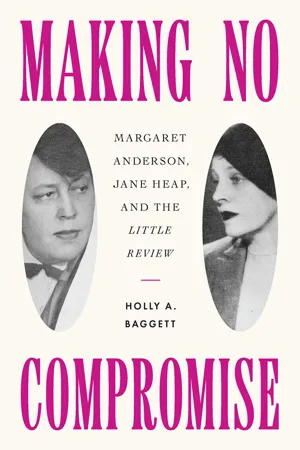
Making No Compromise
Margaret Anderson, Jane Heap, and the "Little Review"
- 312 pages
- English
- ePUB (mobile friendly)
- Available on iOS & Android
About this book
Making No Compromise is the first book-length account of the lives and editorial careers of Margaret Anderson and Jane Heap, the women who founded the avant-garde journal the Little Review in Chicago in 1914.
Born in the nineteenth-century Midwest, Anderson and Heap grew up to be iconoclastic rebels, living openly as lesbians, and advocating causes from anarchy to feminism and free love. Their lives and work shattered cultural, social, and sexual norms. As their paths crisscrossed Chicago, New York, Paris, and Europe; two World Wars; and a parade of the most celebrated artists of their time, they transformed themselves and their journal into major forces for shifting perspectives on literature and art.
Imagism, Dada, surrealism, and Machine Age aesthetics were among the radical trends the Little Review promoted and introduced to US audiences. Anderson and Heap published the early work of the "men of 1914"—Ezra Pound, James Joyce, William Butler Yeats, and T. S. Eliot—and promoted women writers such as Djuna Barnes, May Sinclair, Dorothy Richardson, Mina Loy, Mary Butts, and the inimitable Baroness Elsa von Freytag-Loringhoven. In the mid-1920s Anderson and Heap became adherents of George I. Gurdjieff, a Russian mystic, and in 1929 ceased publication of the Little Review.
Holly A. Baggett examines the roles of radical politics, sexuality, modernism, and spirituality and suggests that Anderson and Heap's interest in esoteric questions was evident from the early days of the Little Review. Making No Compromise tells the story of two women who played an important role in shaping modernism.
Frequently asked questions
- Essential is ideal for learners and professionals who enjoy exploring a wide range of subjects. Access the Essential Library with 800,000+ trusted titles and best-sellers across business, personal growth, and the humanities. Includes unlimited reading time and Standard Read Aloud voice.
- Complete: Perfect for advanced learners and researchers needing full, unrestricted access. Unlock 1.4M+ books across hundreds of subjects, including academic and specialized titles. The Complete Plan also includes advanced features like Premium Read Aloud and Research Assistant.
Please note we cannot support devices running on iOS 13 and Android 7 or earlier. Learn more about using the app.
Information
Table of contents
- Acknowledgments
- Introduction
- 1. The Buzz and the Sting
- 2. Temples of Tomorrow: Anderson and the Little Review, 1914–1916
- 3. Political and Literary Radicals
- 4. Interregnum: Chicago, San Francisco, New York
- 5. Pound, Yeats, Eliot, and Joyce
- 6. Lesbian Literature, Women Writers, and Modernist Mysticism
- 7. George Ivanovich Gurdjieff: A Messenger Between Two Worlds
- 8. The Heap Era
- Epilogue: Post–Little Review Years
- Notes
- Bibliography
- Index